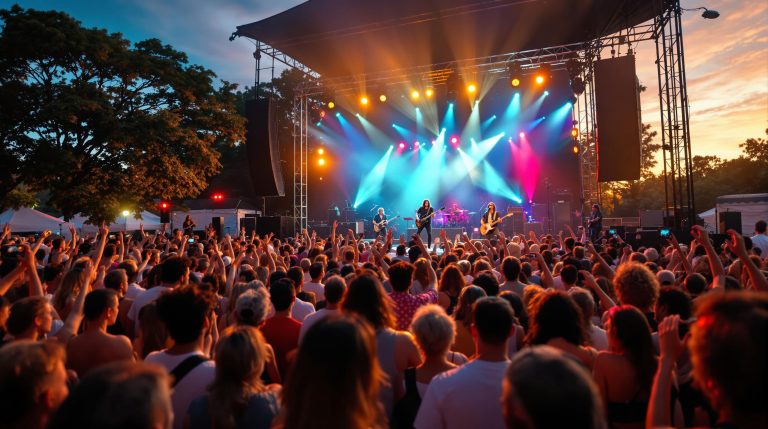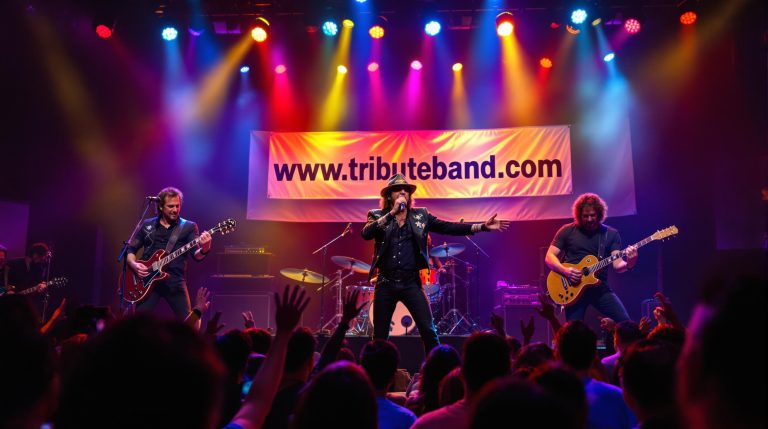Around the late 1950s and the early 60s, after a series of formations and reformations, a band emerged in Liverpool. They called themselves The Beatles. They established themselves as the incredible artists that they were, and a little while after, another band materialized.
They tried to look like The Beatles, they tried to sound like The Beatles and they certainly played songs by The Beatles, however, they were most certainly not The Beatles. No, they were The Buggs. They were a tribute band, and arguably the first. The Buggs formed in 1964, right at the height of Beatlemania. They even made it onto The Ed Sullivan Show, sporting those iconic mop-top haircuts and matching suits that screamed Beatles.
Now tribute bands attract the likes of niche audiences and the disapproval of music critics. However, we make the case that they exist to serve a need not just within the world of music, but in the hearts of fans.
What Is a Tribute Band?
Let’s first get the obvious out of the way.
A tribute band or tribute act is one that is dedicated to studying and performing the music of another (usually well-recognized) musical act. However, it usually goes beyond just the music. These bands often (but not always) attempt to emulate the original act and their style, tone, aesthetic, and atmosphere they create.
The idea is to create as close an approximation to the original act as possible, either completely or at least musically.
What’s the Difference Between a Tribute Band and a Cover Band?
So you find yourself asking “aren’t tribute bands and cover bands kind of the same thing?” Don’t cover bands also just play music by bands they like?
Well no, but yes. Yet, they are not the same.
Cover bands do not restrict themselves to a single artist. Rather, they perform covers of various songs by different bands and artists. A tribute band, on the other hand, is single-mindedly dedicated musically to one great act.
Cover bands also do not put any emphasis on appearing like the original act. They simply play as themselves while covering other songs. The music is where the cover begins and ends.
Tribute acts are typically more focused on emulating everything about the act in question. The music is often only a part of their performance. For some tribute bands, the “show’s the thing” (e.g. Queen, KISS, etc.), whereas for some other acts (e.g., Journey, BOSTON, Pink Floyd, etc.), the music’s the thing.
How Do Tribute Bands Handle the Legal Side?
For some reason, people seem abjectly fascinated about the subject of the legalities of a band performing cover songs, in spite of it being done since cover bands became a thing.
Here’s something that surprises a lot of people. Tribute bands can legally perform copyrighted songs without getting direct permission from the original artists. How does that work?
Most venues already pay licensing fees to organizations like ASCAP, BMI, and SESAC. These groups collect money from clubs, theaters, and concert halls, then distribute royalties to songwriters and publishers. When I book a tribute band for a venue, the legal side is usually already covered.
The key difference is between performance rights and mechanical rights. Performance rights cover live shows, while mechanical rights apply to recordings. That’s why tribute bands can play “Don’t Stop Believin'” live but would need special permission to record and sell their own version.
What Do Tribute Bands Bring to the Fans?
That’s the million-dollar question. Why do tribute bands exist and why do some of them actually have fan followings?
Here’s our assessment.
Nostalgia and a Comforting Sense of Familiarity
There are several reasons one might want to form a tribute band. Quite often, these bands are no longer touring due to creative differences, the death of their members, or just the fact that they’ve retired from music.
Tribute bands can forge a place in the heart of someone who grew up in the 60s, 70s, or 80s witnessing the rise of their favorite bands who are now retired. In an age where these classics are less likely to be heard on the radio or where these bands are unlikely to perform, watching people who look and sound like those great acts can recreate those fond memories in a nostalgic audience.
The Experience of Live Music
Sometimes it is saddening to think that you no longer have the option of watching Pink Floyd or The Beatles live. Live concerts are where the band and the music truly do come alive. For people who never got to watch their favorite bands perform, tribute bands can serve as a consolation prize.
Maybe you didn’t get to watch Kiss live, but at least you can watch a band that looks and sounds like Kiss. And hey, sometimes, like in the case of Tommy Thayer, the lines blur and the tribute band can become the original act!
Did you know that Tommy was once a part of a KISS tribute band called Cold Gin? He played the part of Ash Frehley and replaced him as a guitarist in KISS in 2002. How’s that for a tribute?
The same thing happened to David Victor, who was part of the BOSTON tribute band “Smokin'”, when he got the call to join the mothership on record and on tour. Eric Carr, who drummed for KISS from 1980 until his death in 1991, also came from the tribute scene before joining the band. These stories show just how blurry the lines can get between tribute acts and the real deal.
Keeping the Vibe Alive
Artists are more than their music. Freddy Mercury was more than a singer. He was an entire experience on his own.
While perhaps there will never be a tribute that could ever get close enough to recreate the Queen experience, you’ve got to give them props for trying. There is a certain camaraderie among fans, and that in itself helps create a spirit of community.
When the band itself is a fan playing for other fans, it creates a whole new, enhanced version of this fandom. The fans are the music; the music is the fans. Ad while truly great music never dies, tribute bands certainly help keep it alive.
There’s also a practical side to all this. Tribute bands make live music accessible in ways that reunion tours never could.
While original bands might charge $150 for nosebleed seats, you can catch a quality tribute act for $25 or $30. Local venues that could never afford to book major acts can still offer their customers that live rock experience. It keeps musicians working and music venues in business, especially in smaller towns where the big tours never stop.
In addition to the music, they also help create and maintain a certain allure and timelessness to the art they are emulating. Oddly enough, the fact that a tribute band will never really be the band they are imitating is part of the charm. Almost by design, a tribute band is more accessible, and the fans can feel even more close to the music and magic.
A Tribute to Tribute Bands
Tribute bands create a way for fans to relive good moments they’ve had with their favorite ones and sometimes create new ones. Although tribute bands are often the butt of jokes, and subject of ridicule and critique, they have their fans and most certainly a place in the vast, welcoming world of music.
Are you looking to watch a few quality tribute bands in action?
Check out our show calendar to find awesome acts playing near you! Book your tickets now, or keep checking back for updates. Alternatively, you can also book a great tribute band to play at your own special event.







